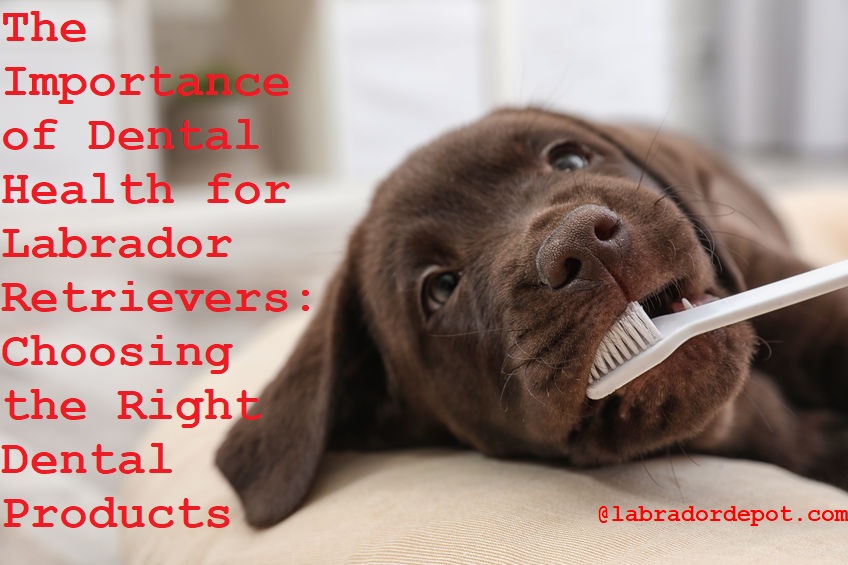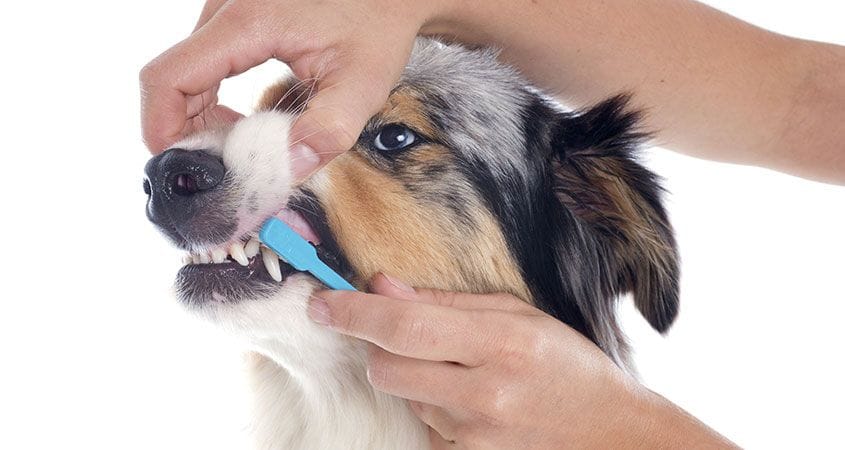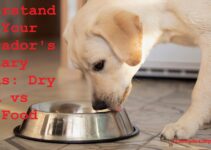Are you looking for the right dental care products to keep your beloved Labrador Retriever healthy and happy?
Keeping on top of their dental health is an essential part of ownership, and this guide will cover everything you need to know from brushing to selecting products.
Dental health is an essential part of caring for a Labrador Retriever. Poor dental care can lead to a variety of oral problems such as gum disease, bad breath, and other forms of infection. It’s important to select the right dental products for your Lab and follow a regular regimen for brushing and other activities to reduce the risk of serious dental issues.
This guide will provide an overview of the importance of dental health in Labrador Retrievers, discuss relevant products on the market, and go through step-by-step instructions on how to care for your Lab’s teeth properly.
We will begin by exploring why dental health is so important in this breed in particular, along with examining some common issues that may arise if it is neglected. We will then review types of toothbrushes available and their advantages, followed by reviewing different kinds of snacks and chews that can aid in your dog’s dental care. Finally, we will finish this guide with a few helpful tips on techniques you can use to keep your pup’s teeth clean and healthy.
Choosing the Right Dental Products
When considering laser dental care for your Labrador Retriever, you’ll want to make sure you find the right one. Properly caring for your Retriever’s teeth is essential in order to maintain their dental health and avoid the onset of tooth decay and other common dental issues. Making sure you have the right tools and dental products on hand can make all the difference.
The first thing you will need to do is decide on a type of toothbrush. Choose one that fits comfortably in your hand, with a soft brush head that won’t scratch or irritate your Retriever’s teeth and gums. You should also look for an appropriate toothpaste that does not contain fluoride, as this can be harmful if swallowed regularly by dogs. Finally, it’s important to buy a finger brush or rubber tip brush specifically designed for pets; these are better than human brushes when it comes to cleaning their teeth.
You should also consider purchasing an animal-safe water additive such as PetzLife Oral Care; this will help keep plaque and tartar from building up if used regularly, helping your Labrador Retriever stay free of cavities and other illnesses in the long run. There are a range of other products available too including tooth wipes, specialty diets for oral health maintenance, enzymatic sprays and dry food additives which can all be beneficial when it comes to maintaining optimum dental health in Labradors (and many other breeds).
Types of dental products available for dogs
When selecting the right dental products for a Labrador Retriever, there are several options available. Depending on your pet’s dental health needs, there are a variety of products that can help maintain a healthy mouth. Below is an overview of the different types of dental products available.
Brushes – Teeth brushing is one of the most important steps in pet oral care. Brushes come in various sizes and shapes allowing you to better fit the brush head to your pet’s mouth size and shape. Some popular brushes include: soft bristle, finger brushes, angled head brushes, rubber tipped brushes, and even electric toothbrushes specifically designed for dogs.
Toothpaste/Gels – Just like people have varieties of toothpaste for different needs, there are several different options for dog toothpaste and gels which help refresh breath and fight plaque and tartar buildup in the mouth. Flavors range from poultry to vanilla mint so finding one your pup will enjoy shouldn’t be a problem.
Mouthwash/Rinses – Mouthwashes can clean hard-to-reach places where bacteria or plaque might reside that brushing may not reach. A special canine rinse should be used as some ingredients in human rinses can be too strong or harmful if swallowed by your Labrador Retriever. The alcohol-free rinse helps reduce plaque while refreshing breath with tasty flavors like beef or chicken that appeal to a pup’s palate!
Treats – Dog treats formulated to support canine oral health come in many forms including chews like bully sticks or teeth cleaning pads featuring grain free treatments that naturally freshen breath while providing needed nutrients (like omega 3’s). Look for food grade quality treats with safe ingredients like vegetables, fruit fibers or meat produced without harsh chemicals added!
Factors to consider when choosing dental products for Labradors
In order to ensure the best possible dental health for Labradors, choosing the right dental products is essential. When purchasing products for your pet’s teeth, consider several factors such as the size of your Labrador, their age, and any existing health conditions they may have. Furthermore, it is important to be mindful of the ingredients in the products you select. Many dental products contain harsh chemicals that can irritate a Lab’s sensitive mouth or even cause further damage in the long run.
When choosing dental products for your Labrador, look for those that are made with natural or organic ingredients and are specifically formulated for dogs. Most general dog toothpastes contain ingredients such as solvents like SD alcohol 40-B and xylitol which can be detrimental to a dog’s health. Additionally, these chemicals can cause infection and other complications if swallowed. As such, it is important to opt for toothpastes that are specially formulated for dogs and are free of these harmful ingredients.
Moreover, factors like size should also be taken into consideration when selecting dental products for your Labrador Retriever. Large Labradors will require an appropriately sized toothbrush while smaller Labs may need a smaller brush head. Additionally, there are different sizes of finger brushes designed to fit all sizes allowing one to easily work around their pet’s mouth and reach hard-to-reach areas more effectively during brushing sessions.
Finally, it is also important to determine which type of toothpaste is appropriate for your pet’s needs since there are different formulas tailored specifically towards various age groups or breeds of dog such as seniors or puppies respectively. Some pastes come infused with antibacterial formulas help prevent accumulation of plaque while other types feature natural antiseptic solutions that help soothe gum irritation when used regularly over time with proper care and maintenance routines followed closely alongside qualified veterinarians advice if necessary.
In sum then; size considerations alongside observation about organic contents present should inform one’s decision when selecting requisite dental hygiene materials and solutions specifically crafted towards optimising your Labrador Retrievers dental hygiene at all times as part thereof ensuring excellent overall wellbeing outcomes through careful regular care initiatives!
Recommended dental products for Labradors
Labrador Retrievers require appropriate dental products to maintain good dental health and reduce the risk of tooth and gum problems. There is a wide variety of products available in the market, including toothbrushes, toothpastes, chew toys and dental treats.
Toothbrushes: A soft-bristled toothbrush is best for Labradors due to their sensitive gums. Choose a brush that fits comfortably in their mouth and makes it easy to access all angles of the teeth. Double-headed toothbrushes are especially useful for brushing upper and lower teeth simultaneously with less effort.
Toothpaste: Look for specially formulated dog toothpaste that contains safe ingredients such as enzymes, baking soda or chlorophyllin to help reduce tartar accumulation at the gum line. Do not use human toothpaste as some ingredients may be harmful if swallowed.
Chewing Toys: Choose toys made from natural rubber or nylon specifically designed for Labradors to encourage chewing and stimulate saliva production which helps cleanse teeth naturally by breaking down plaque-causing bacteria between brushings. The texture also keeps gums healthy by massaging them during playtime.
Dental Treats & Chews: Dental chews can encourage dogs to clean their own teeth using an abrasive product that removes plaque build-up mechanically instead of through chemical action. They also increase saliva flow which aids natural cleaning processes within their mouths, as well as freshen breath naturally with every bite!
III. Implementing Dental Care Routines
Regular veterinary checkups and at-home dental care routines are essential for maintaining a Labrador Retriever’s oral health. Veterinary visits are important for confirming that dental conditions such as gum disease or tooth decay are not present and also provide professional cleaning if needed. Additionally, regular brushing and other at-home dental care habits can help prevent progression of dental diseases in Labradors.
To keep your pet’s teeth free from plaque buildup, use the following tips:
Daily brushing: Using a soft toothbrush with fluoride toothpaste designed specifically for pets, gently brush your lab’s teeth daily or every other day. Be sure to get the hard-to-reach back molars as well as between their teeth so plaque doesn’t build up leading to periodontal disease. Also, introduce dental chews throughout your dog’s life as these can help reduce plaque buildup even further when done on a consistent basis.
Healthy diet: Make sure that your lab is getting a balanced diet that is low in sugar content which can contribute to plaque formation and cause decay in the pet’s teeth and gums. Choose nutritious food with plenty of fiber, vitamins and minerals without artificial ingredients or preservatives—avoiding processed dog treats which contain added sugars that can damage pup’s mouths over time. Feeding harder foods or using toys designed for chewing provide additional exercise for the teeth and gums helping to keep them healthy throughout their lives.
Water additives: Using water additives, such as specially formulated doggy mouthwash, can be an excellent aid in keeping gums healthy when used regularly between brushing sessions (following all safety precautions). These products have been proven to reduce bad breath while also eliminating bacteria from your pet’s mouth throughout their lives.
Importance of regular dental care routines
Maintaining oral care is essential for keeping your Labrador Retriever healthy and happy. Regular brushing and dental check-ups can prevent serious dental problems such as gingivitis, periodontal disease, tooth decay, and even bad breath. All of these issues can be effectively avoided with consistent attention to the dental health of your pet.
Regular brushing helps remove plaque and tartar buildup on the teeth, which in turn reduces the risk of major oral health problems. Brushing should be done at least twice a week but daily brushing is even better for maintaining a healthy mouth. It is also important to choose the right toothbrush for your pet – soft bristle brushes are best as they are gentle on their gums yet still provide effective cleansing.
In addition to daily brushing, dental chews or other treats worked into your pet’s regular routine can help remove food particles from their teeth and reduce buildup of plaque and tartar between visits to the veterinarian for professional care. These chews are great for providing supplemental preventive care between visits to the vet but should not replace regular brushing overall dental hygiene maintenance plans should be designed around both of these approaches in order to ensure optimal oral hygiene is maintained in Labradors.
Lastly routine professional cleaning performed by a veterinarian should be done at least every six months (or once a year as long as gum disease is not present) so that deep cleaning of the teeth can take place along with any necessary extractions or restorations that may be recommended. Regular check-ups like this will ensure that any problem areas are identified early and appropriate treatment provided before further damage occurs it’s also important to make sure that your Labrador’s diet includes high quality kibble specifically formulated for dogs in order for them to get all key vitamins & minerals required for proper dental health maintenance throughout life.
Step-by-step guide to brushing a Labrador’s teeth
Brushing a Labrador’s teeth is an important part of maintaining overall dental health. This step-by-step guide provides everything you need to know about brushing your Lab’s teeth for optimal dental care.
Step 1: Essential Supplies. Gather all necessary supplies, including pet-approved toothpaste, a soft bristled toothbrush, doggie treats and a few towels. To ensure your Lab’s safety during the tooth brushing process, you can also use a muzzle or an Elizabethan collar.
Step 2: Warm Up Your Dog. Begin by getting your Labrador warmed up to the idea of brushing their teeth by playing with them and offering treats and praise. Once they have settled down after a few minutes of play, it’s time to begin the brushing process.
Step 3: Position Your Dog. Next it is important to make sure your Lab is in a comfortable position that allows you access to their mouth safely and securely. For larger Labs it can be helpful to have someone help hold them while you brush (just make sure they don’t mind getting wet!). For smaller dogs, have them lay on the edge of the sink or on their back in your lap with their head secured gently between two arms will work just fine.
Step 4: Brush Their Teeth Gently But Firmly. Once in position it’s time for the main event! Be sure to apply an even layer of pet-approved toothpaste over the bristles before you begin gently brushing their teeth and gums with circular motions making sure not to forget those back molars! You may periodically remove some accumulated saliva with a damp cloth if necessary but keep going; this shouldn’t take more than 2 minutes per session if done correctly!
Step 5: Reward Your Pup After We Are Done Brushing! Praise them lavishly when done as this can significantly increase your pup’s desire for brushing as well as make things more enjoyable for both parties involved! Some doggie treats are sure to encourage good behaviour too but avoid having too many available throughout this process so they don’t become distracted while you brush their pearly whites!
Alternative dental care options for Labradors
For Labradors that may not take kindly to brushing their teeth regularly or find dental products such as tooth brushes and toothpaste undesirable, there are several alternative options available for ensuring your pup’s pearly whites stay in peak condition.
Toys: There are a number of dental chew toys on the market designed specifically for Labradors, featuring rubber or plastic bristles which will help to keep plaque and tartar at bay while your pup plays. While this is a good way to maintain your pup’s oral health, it should be noted that it should not be seen as a substitute for regular brushings with toothpaste and a brush.
Dental Treats: There are many types of dog-friendly treats on the market which vary in size, shape and ingredients – all produced with the aim of helping your pup maintain good oral hygiene. Whether hard or soft, these treats often contain ingredients such as baking soda or special enzymes which help break down bacterial plaque on the teeth. Like any other treat, moderation is key when giving these to your Labrador.
Dental Rinse Solutions & Sprays: Similar to humans who use mouthwash after brushing, dogs can also benefit from such solutions. Dental rinses can help freshen breath, reduce tartar formation and promote healthy teeth and gums with frequent use (usually twice daily). It should be noted that these solutions are not intended to replace brushing but rather compliment regular brushings with a toothbrush and toothpaste.
Finally, it is important to schedule regular checkups with your veterinarian to ensure that all aspects of dental hygiene (including checking for infection) are being met as well as early intervention if any issues arise regarding oral health.
Maintaining Dental Health
Keeping the dental health of your Labrador Retriever in top condition is crucial for their overall wellbeing. Because of the specific physical characteristics associated with this breed, they can be prone to certain oral health conditions that require preventative care. In order to maintain optimal dental health, it is important to establish a hygiene routine and utilize dental products that are designed specifically for dogs.
A thorough brushing two to three times a week using an appropriate dog toothbrush and toothpaste will help remove plaque buildup while stimulating the gums and freshening breath in the process. Additionally, you should use specially formulated oral sprays or water additives, which work to kill bacteria and reduce tartar buildup over time. Chews such as dental sticks or bones can help strengthen jaw muscles as well as scrape away plaque from hard-to-reach areas of the mouth. A diet low in sugar content also contributes to good oral health because sugars feed plaque-producing bacteria that can lead to cavities, bad breath and discomfort.
Ultimately, by following these tips, you can keep your Labrador Retriever in excellent dental health for years to come!
Importance of regular check-ups with a veterinarian
Regular check-ups with a veterinarian are essential to ensure that your Labrador Retriever is in optimum health and has the right dental care. During these visits, your vet will examine their teeth and gums, paying close attention to any signs of infection or disease.
It is important to remember that dental problems can lead to further health issues and regular oral hygiene should be a priority in caring for your dog. Your vet may also recommend a dental cleaning, which involves scaling and polishing their teeth as well as using an antibacterial rinse. If necessary, they can also prescribe fluoride treatments or antibiotics if there is evidence of gum disease or tooth decay.
Following their advice is essential for the prevention of toothache and other related health issues such as bad breath or difficulty eating.
Signs that indicate a dental issue that requires veterinary care
Good dental care is key for Labrador Retrievers, and oftentimes veterinarians or veterninary dentists are needed for more serious issues. Some signs to watch for that indicate a problem in the mouth that requires a visit to the vet include: persistent bad breath, excessive drooling, red or swollen gums, bleeding from the mouth; chipped, broken, loose or discolored teeth; an inability to chew food properly; reluctance to eat or chew; pawing at the face or rubbing it against furniture and/or showing pain when eating.
If any of these signs persist after brushing your Labrador Retriever’s teeth and providing regular dental chews then it’s probably time to take them to the vet for further examination. Through a thorough inspection and X-rays your vet can diagnose any problems such as periodontal disease, tooth decay and infection. Treatment may involve antibiotics, cleaning of the teeth (professional deep cleaning), extractions or additional procedures as required by your pet’s condition.
Making sure your Labrador Retriever has good dental hygiene is an important part of being a responsible pet owner. With routine brushing (twice weekly) and giving them dental chews as directed by your veterinarian you can reduce plaque accumulation in their mouth – which if left untreated can lead to dental issues including possible poisoning of lipids in their blood stream and overall wellness concerns due heart disease caused by bacteria entering the body through diseased gums. Remember prevention is key!
Tips for maintaining a Labrador’s dental health
Maintaining your Labrador’s dental health is an important part of ensuring their overall wellbeing. Fortunately, there are some simple steps you can take to help keep your dog’s teeth in great condition. Here are some tips for keeping your Labrador’s teeth healthy:
- Brush Your Dog’s Teeth Regularly – Brushing your dog’s teeth with a soft bristled toothbrush and a toothpaste specially formulated for dogs is the best way to keep their teeth clean and to prevent plaque build-up. Make sure to brush at least twice a week with a pea-sized amount of toothpaste.
- Use Veterinary Prescribed Dental Products – As part of regular vet visits, have your vet check on your Labrador’s dental health and provide advice on any necessary treatments such as scaling or polishing. Additionally, they may also advise using particular dental products such as oral rinses or chews which can help reduce plaque build-up over time which should be used as directed.
- Feed Your Dog a Balanced Diet – A balanced diet filled with nutrition-rich foods can help promote good oral health in Labradors by providing essential vitamins and minerals that aid in the strengthening of their gums and maintaining the lining of their mouths healthy. Additionally, chewy toys that act as natural teethers or treats designed for oral health care are also great for promoting good dental hygiene in Labradors.
- Regular Vet Visits – Making sure your Labrador has regular checkups with a veterinarian is essential for making sure they maintain good dental hygiene as well as detecting any underlying issues early on before they become more serious problems down the road. During these visits, have the vet check their mouth including checking gum lines and performing an intraoral examination and have them clean the teeth when necessary if it hasn’t been done before 12 months of age.

Conclusion
It is important for Labrador Retriever owners to be aware of the many dental care needs that their animals must have. Dental health is an important part of overall pet care, and should not be overlooked. Seeing a veterinarian for an annual teeth-cleaning is just one step in the process.
Proper diet, consistent teeth brushing, and regular dental check-ups should all be part of a Labrador Retriever owner’s routine. Additionally, selecting the right dental products can help ensure that your pet remains healthy and has strong teeth throughout the course of its life.
When it comes to maintaining dental health in Labradors, any investment you make in high-quality products will pay off in the long run.
FAQ’s
How important is dental health for dogs?
Dental health is extremely important for dogs as poor dental health can lead to various health problems such as infection, pain, tooth loss, and even organ damage.
What is the importance of following good dental health?
Following good dental health practices can help prevent dental problems, improve overall health, and save money on costly dental procedures.
What is good for dogs dental health?
Good dental health for dogs includes regular brushing, providing dental chews or toys, a healthy diet, and regular dental check-ups by a veterinarian.
What do you think is most important to promote oral dental health?
Regular dental cleaning and check-ups by a veterinarian are the most important ways to promote oral dental health.
Why is dental care important in animals?
Dental care is important in animals as it helps prevent various health problems such as tooth decay, gum disease, and oral infections, which can affect overall health.
What is the most common dental problem in dogs?
The most common dental problem in dogs is periodontal disease, which is caused by a buildup of plaque and tartar on the teeth.
What do I need to know about dog dental care?
Dog dental care includes regular brushing, providing dental chews or toys, feeding a healthy diet, and regular dental check-ups by a veterinarian.
What is the number 1 best way to prevent dental disease in dogs?
The number one best way to prevent dental disease in dogs is to brush their teeth regularly.
What are 4 ways we can maintain good dental health?
Four ways to maintain good dental health include regular brushing, flossing, eating a healthy diet, and regular dental check-ups.
Which care is important for the health of your teeth?
Regular brushing, flossing, and regular dental check-ups are important for the health of your teeth.
See Also-
- Best food for labrador puppy
- Best hair brush for Labrador
- Best harness for Labrador
- Best shampoo for Labrador
- Best toys for labrador puppies


